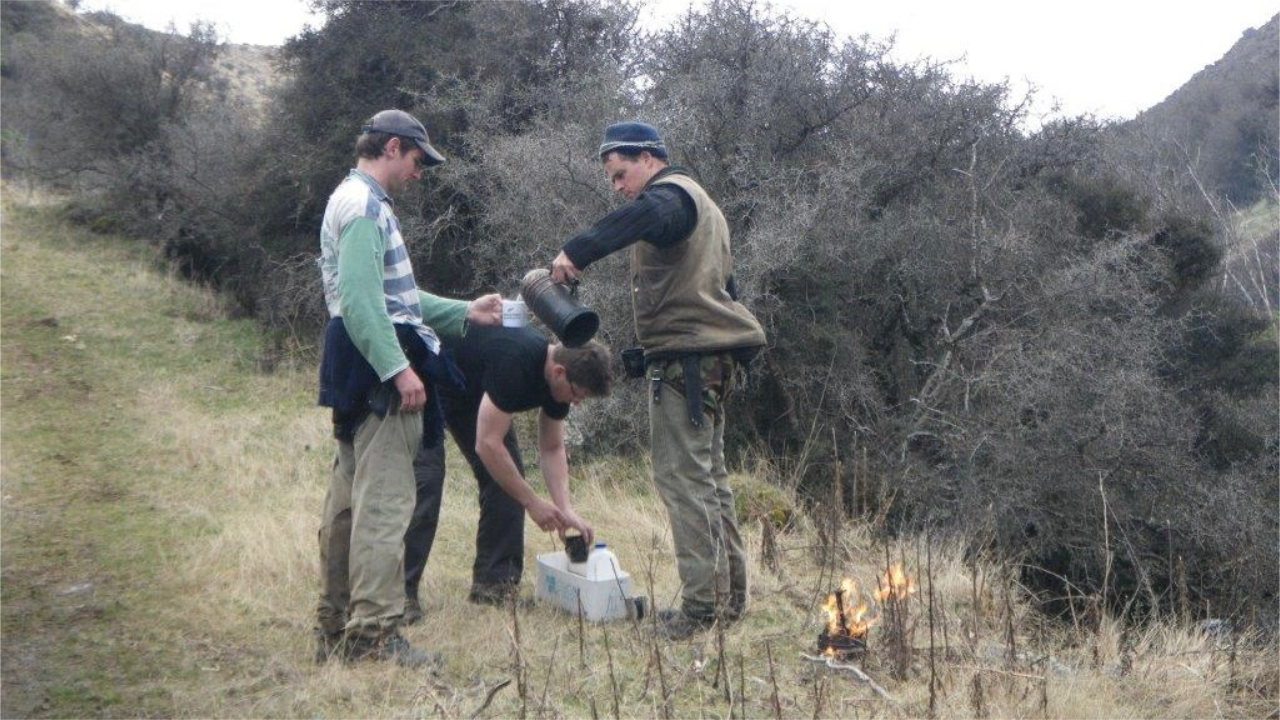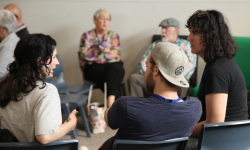
Let’s see the churches welcome chaplaincy in from the cold, someplace out on the fringes, and then let’s send the church, a multitude of trained and equipped ambassadors or chaplains, back out to the fringes to bring gospel renewal.
This occasional weekend column called ‘Pondering:…’ is where people from within the ‘Team of 40,000 Baptists’ can share issues they are thinking about in a way that opens up a topic from a particular perspective. Feel free to comment on these pieces or contribute your own pondering. Opinion pieces are the views of individuals and need to be considered within the context of the diversity of our union of Baptist churches in New Zealand. When commenting or contributing, please follow our Guidelines for articles, opinion pieces and online comments.
This Pondering below comes from Paul Askin, a member of Rangiora Baptist Church in North Canterbury. Paul describes himself as a hunter, author, and Baptist representative on and chair of the Chaplains Defence Advisory Council. He has been pastor, church planter, Treaty of Waitangi supporter, farmer, profligate spender of money on books, informal community chaplain, occasional preacher, co-leader of Te Raranga (an inter-church network in Christchurch), big-time husband and family man, and biggest deal: apprentice of Jesus.
Introduction
Integrating chaplaincy into the wider family of our collective of churches is something I have been thinking about for a considerable time. At the Chaplain’s Day at the National Hui last year, our National Leader, Charles Hewlett, asked me to reflect on this integration. I was very glad to do so; it is an important issue. What follows is my contribution to what I hope will be an informative and constructive discussion. The aim is to strengthen faith communities as they bring gospel renewal to all sorts of people and places.
Integration
Since chaplaincy is, in one sense, a small subset of church, I want to start by making some observations about church. As I read Scripture, church is the community of God’s people, his disciples; people committed to God’s ongoing process of spiritual transformation, which changes the way we are and think. Church is people growing into the fullness of the stature of Jesus.
Integral to this life of discipleship, and a natural, inevitable outworking of it, is an influence and sometimes an impact in the lives of people the disciple encounters in the everyday course of their life, people who are not yet followers of Jesus.
A critical responsibility of leaders within the church is forming and equipping the saints for ministry work. We are to teach disciples to obey all the commands Jesus gave us.
All of us are formed by the world we live in. When we submit ourselves to the Lordship of Jesus, we commence a process of reformation into being a different person, living a new and different life. Using Paul’s words, “If anyone is in Christ, there is a new creation: everything old has passed away; see, everything has become new” (2 Corinthians 5:17). Three verses on, Paul writes these words about our role as disciples, “So we are Christ’s ambassadors,… God is making his appeal through us” (2 Corinthians 5:20). An outcome of discipleship is that we each become, “a letter, written not but with pen and ink, but with the Spirit of God” (2 Corinthians 3:3).
Mike Breen writes, “If you make disciples, you always get the church. But If you make a church, you rarely get disciples.” He goes on to say, “We need to understand the church as the effect of discipleship and not the cause. If you set out to build the church, there is no guarantee that you will make disciples. It is far more likely that you will create consumers who depend on the spiritual services that religious professionals provide...If you know how to disciple people well, you will always get mission... That’s simply what disciples do.” [1]
As churches work with the Spirit in the spiritual reformation of disciples, disciples are equipped and prepared to be Christ’s ambassadors. Or, as I like to say in this context, to be chaplains in all the varied life situations and contexts they find themselves in. Often these ambassadors or chaplains will be the only person God has available to use in the life of some person or group of people, be it in a home, a street, a workplace, a sports team, an educational facility, a shopping mall car park, or wherever.
This understanding impacts our understanding and practice of church. Rather than seeing church gatherings as events to inspire and encourage believers to survive another week in the world and to attract new believers, church is the community where disciples learn how to abide in Christ, to live in the Spirit, to joyfully wear the yoke Jesus invites us to take up with him, and to demonstrate spiritual wisdom and maturity in all situations, however challenging they may be.
This understanding also impacts our view of mission. Rather than seeing mission as something done primarily in the centre, when the church gathers for an event, mission happens naturally and organically on the fringes, carried out by a multitude of transformed disciples, most of whom are unsung and unpaid.
There are many barriers to Christian belief in our current, increasingly secular environment. The tide of public perception is turning away from us. Sometimes, sadly, we contribute to this trend. There are many powers and principalities actively working against us, but with the resourcing God gives and with prayer, we are anything but defeated.
The letters from Christ, written not with pen and ink (or on a screen) but with the Spirit of God, will be read. The appeal of Christ made through his ambassadors will be heard, despite the opposition sometimes encountered. And people will respond, becoming transformed disciples themselves. This can happen, is happening, and has happened, even in times of life-threatening persecution, when church leaders have appointed bouncers to be at the door of church gatherings to keep strangers out!
In a church where the vision and practice are focused on growing and equipping all disciples to be ambassadors or chaplains in their daily lives, in the situations and communities where they live out their lives, “professional” chaplains can be valuable and encouraging exemplars within the church community. For professional chaplains, this responsibility is good; it’s a helpful reminder to them to keep on course as representatives of the living God.
Using Peter Berger’s famous words, chaplains, pastors, and all church members together can enable the church to be a “plausibility structure” [2], authenticating the claims of the gospel of Jesus. Dennis Hollinger hit the nail on the head when he wrote, “Post moderns can best understand a holy, loving, just, forgiving, life-giving God of grace when they see a holy, loving, just, forgiving, life-giving community founded on the grace of God.” [3].
Integrating chaplaincy and church life becomes much more straightforward when we all focus on obeying all that Jesus taught us and on being reformed into authentic disciples, and then being available to be used by God at any time, in any place, in the spiritual journey of others. Often, a disciple will be unaware of their influence; they are just living their normal life in Christ, but for the people watching, it may well be anything but normal. It could be the catalyst to jar them into a new way of thinking and living.
I work and pray toward the equipping and encouraging of as many disciples as I can, disciples who are Christ’s ambassadors or chaplains wherever life takes them. And I am amazed at the many privileged, apparently random opportunities I am given to be an ambassador of Christ or his chaplain, especially in my relationships with non-believers and my connections with Christian brothers and sisters.
Further thoughts
Chaplaincy
Chaplaincy is very outward-focused. Chaplains usually work on their own or in very small teams among a far larger group of people, most of whom do not own Jesus as Lord.
The chaplain accepts and welcomes a position with little or no institutional power, accepts being an anomaly, and accepts the possibility of being misunderstood, ignored, or even rejected.
In this context, the chaplain quietly builds relationships and seeks to grow trust, taking a long-term view rather than looking for short-term results. This is true even if the chaplain anticipates that they might have just one conversation with a person. The chaplain accepts that they may well see “little return” for much of the time and effort they invest in people. This doesn’t mean good things don’t happen; it’s just that such outcomes are often unseen by the chaplain and certainly by the church.
We trust that a chaplain lives a deep and meaningful life of faith in God in front of the people watching them. For the chaplain, building trust and respect is a priority, however long that might take. As the stuff of life unfolds, for disciples in their own lives and in the lives of the people they interact with, questions are asked, decisions are made, and intellectual and emotional commitments are arrived at as steps on a journey.
When viewed from the perspective of organised church institutions, chaplaincy is on the fringe. It is out on the edges, not easily visible to church structures, and even less easily controlled by church hierarchies. While I think this situation should be welcomed as a continuation of the gossiping of the gospel by countless nameless heroes in the early days of the church, I believe it is not valued in our world in the way that the New Testament celebrates such a contribution.
The temptation for chaplains, as I see it, is to simply be wonderful, kind, caring people with a Christian flavour, a Christian persona, and a low expectation of significant spiritual transformation in the lives of the people they minister. This approach is, of course, an easier road to acceptance.
Church
Many church leaders and members use measures like attendance at Sunday services, number of baptisms and financial figures as indicators of health and success. These measures are often used to determine how a church is “doing.” People want their church to feel like it is tracking well and has a good future. Usually, they will be committed to some degree, at least, to helping ensure a positive outlook for the church. Leaders normally do what they can to help ensure a viable church moving forward. No one wants to be part of turning out the lights and closing the doors for keeps on a church.
Hence a tendency to develop people trained and educated to build, serve and lead the organisation of the church, leaving these people untrained and ill-equipped when it comes to the life-changing process of making disciples.
Churches tend to look for an identifiable return on the efforts made in the wider, non-believing community they are a part of. Understandably they prefer these returns to happen in the shorter term rather than the long term.
Consequently, their interaction with their wider community is often structured for quick results rather than long-term impact. Relationship building and the growth of trust take time. I believe the desire for a ‘quick return on effort’ commonly leads to a reliance primarily on intellectual or emotional persuasion. I think it’s assumed, not always correctly, that relationship-building will come later.
The temptation for many churches, again as I see it, and drawing on personal experience, is to focus on whatever it is felt might help increase numbers in the church. However, gaining church attendees is not necessarily the same as making disciples. Sometimes it becomes all too apparent that these two outcomes are very different. The experience of many churches over the recent years of the COVID-19 pandemic bears this out.
Making disciples
Now let’s turn our attention to making disciples. I contend that Jesus’s command, “Go and make disciples,” has often been re-interpreted as “Go and build the church.” But that is not the command! Jesus said he would build his church, and nothing would defeat him. He told us to make disciples, baptise them, and teach them to obey all he commanded. Sadly, I believe that his instruction to teach disciples to obey all his commands is regularly overlooked and even ignored. This has been called the Great Omission! [4]. Of course, before anything else happens, the disciple-maker must be an authentic disciple themselves! The initial focus must be on the disciple maker’s own transformation into Christ’s likeness. Why would anyone choose to join us if we are not demonstrably different?
I think a lesson of church history is that authentic disciples are an irresistible force for change and spiritual growth, even in times of savage persecution. Sadly, another lesson of history is that disciples in name only regularly bring the church into disrepute.
When Paul wrote his letter to the new believers in Colossae, he described mature Christians as those who would be “filled with the knowledge of his will in all spiritual wisdom and understanding, so as to walk in a manner worthy of the Lord, fully pleasing to him, bearing fruit in every good work and increasing in the knowledge of God” (Colossians 1:9,10).
People who are genuinely being reformed by Jesus, becoming grace-filled, humble and courageous, resilient in the face of suffering, forgiving and loving like him, can trust the Spirit to be active in transformative ways in the lives of the people among whom they serve Christ.
Harmonising chaplaincy and church life first requires a common commitment for believers to be genuine disciples. Then they work with God in the power and wisdom of the Spirit to make disciples.
Christ’s ambassadors or chaplains need churches they can confidently introduce enquirers to, churches where Christ’s astonishing beauty and mystery are unmistakably revealed, churches where enquirers will be assured of a genuine welcome and the offer of an understandable pathway into discipleship.
What chaplaincy can bring to this relationship with church is the understanding and practice of relationship building, the value of real trust and love, and an appreciation of the patient ferment of the Spirit.
“The Christians (of the first centuries) believed that God is patient and that Jesus visibly embodied patience. And they concluded that trusting in God, they should be patient – not controlling events, not anxious or in a hurry, and never using force to achieve their ends…As we ponder patience, we will come closer to understanding the resilience and distinctive lifestyle of the early Christians that led to their growth in numbers.” [5].
Churches can bring deeply formed disciples, who are the resource for forming new disciples. Churches can also bring kingdom life, a vital resource because it’s almost impossible to grow disciples outside of Christian community. Churches are God’s plan and place for the reformation of people out of discipleship in the world to discipleship in the kingdom.
It is vital that churches regularly monitor themselves, checking that their understanding of church aligns with the priorities we see in the New Testament. Churches today, I believe, are all too often unthinkingly immersed in a Christendom understanding of church life and function. This differs markedly from a pre-Christendom understanding or from what I think is the rapidly emerging post-Christendom environment.
Churches and chaplains are called to the same life and ministry, described as Christ’s ambassadors (chaplains) through whom God appeals to people to return to him. When the church is being the church, many people are ready, prepared and equipped to take up organised chaplaincy positions because they are already living and functioning organically as chaplains, infiltrating their communities in word, sign and deed with the good news of new life now, in Jesus.
Recommendations for consideration
>> Increase the emphasis on the intentional formation of disciples in our churches, starting with our leaders. Consider this statement from Dallas Willard: “Every church needs to be able to answer two questions. One: Do we have a plan for making disciples? Two, Does our plan work?”
>> Encourage all disciples to see themselves as kingdom agents (chaplains) in the settings where they are. Intentionally equip them with the attitudes, skills, gifts and spiritual wisdom required to function in this way.
>> Nurture the practice of “faithful presence,” which is “the incarnation of a kind of leadership that realises in the relationships we have, in the tasks we undertake, and within the actual places (both physical and social) we inhabit, the shalom that comes from God and that is God in the person of Jesus Christ.” [6]
>> Resist the temptation to structure things in such a way that the church organisation absorbs too much of the disciples’ time and effort. Free people to invest in the lives of people they are among outside the church community. Celebrate these activities, and tell the stories. Value the fringe!
>> Resist the temptation to truncate the gospel into a message focusing on little more than personal sins forgiven and the promise of a place in heaven.
>> Provide training for chaplains, including courses at Carey Baptist College, but resolutely resist the temptation to over-professionalise chaplaincy. Large numbers of effective volunteers, trained and trusted, being ambassadors of Christ wherever they are, are a force for the gospel like nothing else.
>> Develop an appreciation of the patient ferment of the Spirit.
>> Encourage all church leadership groups to actively expect their pastoral staff to participate for half a day a week in a chaplaincy role which fits each pastor’s interests and abilities. This needs to be part of their job description. Most often, it will be a voluntary role. This kind of regular exposure to interaction with the wider community will profoundly benefit the people the chaplain serves in this way and, without a doubt, will benefit the supporting church community.
>> Encourage serious theological reflection around issues like freedom, truth, justice, the nature of the gospel, the determining ideas and philosophies in the wider community, leadership, pastoral intelligence, creation care, identity, reconciliation, worship, the nature of the church and mission in a post-Christendom world. Intentionally grow a culture where questions are welcomed.
>> Actively reject the temptation to tend toward Constantinian understandings and practices, including the desire for power and domination and politicising issues. Instead, understand our identity as that of exiles and aliens in the world on the one hand, living stones being built into a spiritual house indwelt by the Spirit on the other.
>> Be certain not to allow the church institution to become an idol. It happens much more easily than many people think!
References
1. Mike Breen. “Building a Discipling Culture.” 2009 p 11, 12
2. James Davison Hunter. “To Change The World. The Irony, Tragedy, and Possibility of Christianity in the Late Modern World.” 2010 p202
3. Nancy Pearcey. “Saving Leonardo.” 2010 p 276
4. Dallas Willard. “The Great Omission, Reclaiming Jesus’s Essential Teachings On Discipleship.” 2006
5. Alan Kreider. “The Patient Ferment of the Early Church. The Improbable Rise of Christianity in the Roman Empire.” 2016 p 2
6. James Davison Hunter. “To Change The World. The Irony, Tragedy, and Possibility of Christianity in the Late Modern World.” 2010 p269
Read other contributions to our Pondering… column here.
Photo: supplied by Paul Askin


